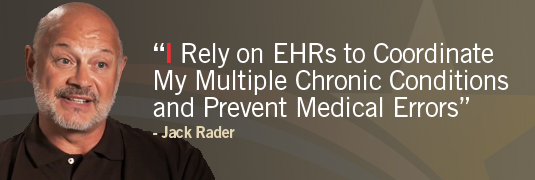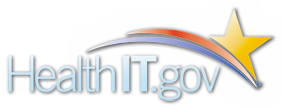Jack Rader


“I Rely on EHRs to Coordinate My Multiple Chronic Conditions and Prevent Medical Errors”
Jack Rader is an advocate for electronic health records (EHRs) because as a patient with congestive heart failure and multiple chronic conditions, he already has enough to worry about. EHRs give him the peace of mind that comes with knowing that his doctors have all of the information they need to make the right decisions about his care.
When an error in my heart medication resulted in a trip to the hospital, I saw firsthand what can happen when doctors don't have access to the right information about a patient's medical history.
I have congestive heart failure, and I had just switched cardiologists. My new cardiologist provided me with new medicine without cancelling my current prescriptions. As a result, I ended up accidently overdosing on my medications, which landed me in the emergency room.
That ambulance ride was terrifying, and it's something I never want to experience again. To make matters worse, the emergency room didn't have access to any of my records, so the staff didn't know that I also have diabetes. I was there for hours, and I kept getting sicker because my blood sugar was dropping, but the doctors had no way of knowing what was happening. I was in such bad shape, I couldn't communicate with them.
An EHR system would have detected the medication error and warned the doctor of the danger. And that entire experience could have been avoided had the doctors and emergency room used EHRs to safely and conveniently manage my care.
Managing Multiple Chronic Conditions
I'm not a simple patient, I know that. That's why it's so important to me to have an electronic system that helps simplify the coordination of my care. In addition to multiple chronic conditions including congestive heart failure and diabetes, I have sleep apnea, two crushed vertebrae that are pushing into my spinal cord, and neuropathy in my legs. I have a lot of doctors. There's my family physician and an endocrinologist, plus an electrocardiologist and a regular cardiologist. And I have a defibrillator and a pacemaker – I'm practically running on batteries. So sharing my health data between so many doctors is crucial. EHRs make accessing and sharing my health information easy. That's one less thing I have to worry about.
When I visit my doctors who have EHRs, it's so comforting to sit down and have the doctor immediately pull up my medical information, including current and historical data. Everything is right in front of my doctor: my past symptoms, treatments, etc. Even better, the chance of mistakes with prescriptions is minimal.
Health IT Eases Stress on Medical Staff, and In Turn, Patients
I'm pretty verbal about what's going on with my health, and I'm the type of person who asks a lot of questions, which is important when you have as many multiple chronic conditions and see as many doctors as I do. After being diagnosed, I tried to research and understand my conditions so that I could play an active role in my own health care. Still, it can be hard to keep track of all your information when you are dealing with multiple chronic conditions. It's easy to get lost in a web of information. EHRs help me stay on top of that information, so that I can stay on top of my health.
And of all the doctors that I see, it's those who use EHRs that make my life as a patient easier. One of my physicians, Dr. Edward Sobel,* uses EHRs in his office. You can see instantly – as soon as you reach the front desk – that EHRs are making the doctors, nurses, and staff run a more organized practice. So many times, you go into an office where the staff is always in panic mode and stressed as they sort through paperwork, causing the patient service to be less than desirable. At Dr. Sobel's office, however, everything is organized through EHRs, so you feel like you're in good hands with a staff that's responsive and informed.
The front desk of a doctor's office is like the front door of a home. It's not just where you are greeted or checked in, but it also sets the tone for your entire visit. Being organized makes a world of difference for a patient – an organized, calm reception desk makes you feel confident in your care.
Doctors Are Just an Email Away
One of the most comforting aspects of EHRs is that a patient's access to his or her doctor is much greater. Dr. Sobel has a web page that allows me to sign in and set up my account, giving me access to my records and test results, such as blood test results. I can also set up appointments through his site and even reach out to the doctor by email to ask questions. Because of EHRs, I feel like I'm connected to my doctor 24 hours a day.
Health IT Improves My Care: I'd Like to See Every Doctor Adopt EHRs
For me, paperwork is more than just documentation of visits; it's a record of the progression of my health and information that needs to be shared from doctor to doctor to provide me with the most effective, personalized, and responsive care. Sharing my medical records from one doctor to the next is critical to coordinating the care I receive and to preventing medical mistakes. I've experienced doctor visits where the doctor sits down with me and then realizes he has someone else's documentation in my folder. With EHRs, this doesn't happen.
In the end, it's the wasted time at each visit that is really tiring for a patient, especially when you're not feeling well to begin with. It's taxing to go from doctor to doctor and repeat your entire medical history time and time again. When you visit a doctor, and they're so focused on updating information, they hardly have time to evaluate you or talk through questions. It makes the visit less efficient and productive. In my experience, doctors using EHRs are more efficient and can offer more quality time to the patient – leaving both the patient and doctor satisfied with the visit.
*Dr. Edward Sobel, Family Practice Associates, PA, Wilmington, DE, was one of the providers recognized during the recent Meaningful Use Vanguard (MUVer) event sponsored by Quality Insights of Delaware – Regional Extension Center. The MUVer event recognized Delaware providers, who are leaders in adopting certified EHR technology.

